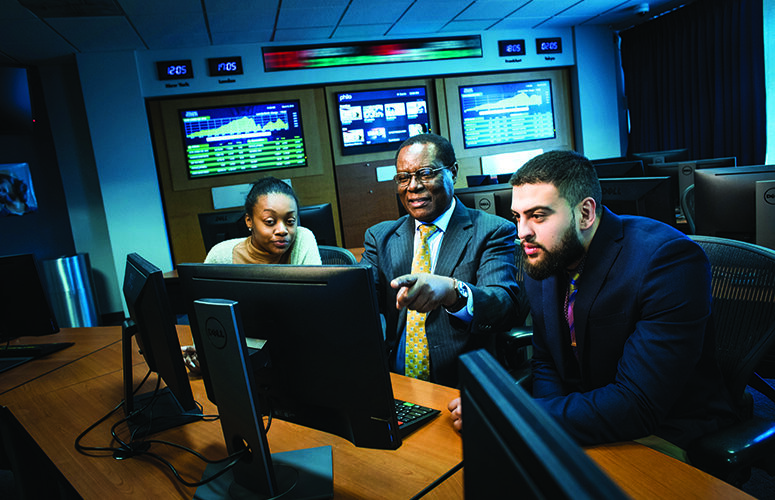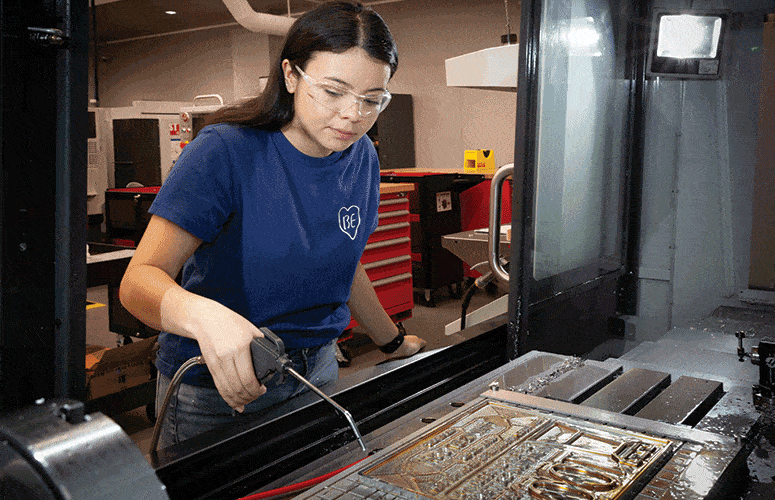
Career Metamorphoses
Key academic degrees afford opportunities for career-changing adults, but these students also face unique challenges.
By George N. Saliba, Contributing Writer On Nov 13, 2023In the spirit of Victorian-era writer George Eliott’s observation that “it is never too late to be what you might have been,” Americans and New Jerseyans are changing careers at rapid rates, with Pew Research Center reporting that 19% of Americans quit their jobs in 2021, and that 53% of those doing so embarked upon new careers. Higher education experts interviewed by New Jersey Business Magazine cite workers’ desire for more income as well as the impact of marital divorces, job burnout, and a need for work flexibility among factors funneling students back into college classrooms or toward new careers in general.
Opportunity clearly beckons: For example, with New Jersey’s nursing workforce expected to decrease by 5% over the next three years as retirements outpace new nursing graduates, nursing students face excellent prospects. And with 25% of the world’s top 100 financial technology companies located in New Jersey, opportunities abound in that realm as well, with academic degrees in finance, computer science and engineering often paving the way to lucrative careers.
Today’s overall career opportunities are at times centered on computer science technology and data science, but also reflect worker shortages – and therefore demand – for educators, mental health professionals, social workers, and gerontology health workers, explains Christopher Romano, Ed.D., vice president of strategic enrollment, outreach and engagement at Mahwah-based Ramapo College. Analytics, as well as academic degrees related to the life sciences, also align with the job market.
There is more to the equation: South Orange-based Seton Hall University, for example, has approximately 130 graduate degree programs and certificates, with newer offerings in applied physics and engineering that blend advanced physics with engineering fields such as nanoscience, quantum engineering and material science. These align with New Jersey careers in the life sciences, IT, and even manufacturing.
But nothing is entirely clear cut: Today’s students are faced with a rapidly evolving world replete with emerging artificial intelligence as well as developments within the higher education landscape itself. Christopher Cuccia, Ed.D., associate provost for academic and graduate affairs at Seton Hall University, explains, “Adult students are looking for schools and services that will equip them for the future of work, which means ultimately cultivating adaptive learners who can thrive in a world that is extraordinarily volatile and uncertain – and as much as we would all like it to be otherwise – extraordinarily complex.”
Choosing a New Career Path
The desire to attain these adaptive skills and in-demand academic degrees is not always easily aligned with adult students themselves. While some students possess laser-like knowledge of who they are and how they want their work lives to unfold, others must avail themselves of in-person career counseling as well as online tools such as Myers-Brigg Type Indicator personality assessment and O*NET Interest Profiler™. Experts say the key is to align the person’s skills, talents, and demeanor with the realities of the job market’s pay scales and career outlook trajectories. The US Bureau of Labor Statistics’ Occupational Outlook Handbook is widely cited as a tried-and-true source regarding the latter.
The entire career change process requires consideration, says Darren Wagner, vice president of strategic enrollment at Glassboro-based Rowan University. “[You] have to know what opportunities there are in the marketplace,” he stresses. “Will [the career] provide you with the income you need to maintain the lifestyle that you want? More important than that – from an education standpoint – what does it take to be a good candidate for those positions? What education, training and certifications do you need?”
At times, students will need a bachelor’s degree, and at other times, a master’s degree. “In my experience, often those [people] who are looking to make a mid-career change have a bachelor’s degree that they attained earlier in life as an undergraduate student, and then they reached a point as they approached maybe their 30s, 40s or beyond when they say, ‘This just doesn’t reflect who I am at this point,” adds Seton Hall’s Cuccia. “So, [students] are looking to retool, and a graduate degree – a master’s degree or beyond – serves very well for that purpose.”
Balancing Education with Other Obligations
Returning to colleges/universities can be challenging for adults given that the US has the greatest number of single-parent households in the world. According to Pew Research Center, 23% of US children live with one parent and no other adults, which is more than three times the 7% of children worldwide who do so. This means single parents – nearly one in five who are men (according to Pew) – can struggle with childcare demands and related issues when pursuing education. Adding to this equation is the fact few adults can quit their current jobs/careers to attend college classes on a full-time basis; financial considerations can be a factor.
“It’s important for folks who are changing careers to find programs at a school that understands the needs of the adult learner, and are not just trying to force an adult learner into the traditional college model,” says Ramapo College’s Romano. Flexible and online hybrid learning models can help these students.
Regarding financial challenges, Romano adds, “[People] think about cost in terms of what the program costs them flat-out, but then I think it’s sometimes navigating these other costs like textbooks, technology upgrades, and childcare that maybe they don’t initially think about. I think understanding that hurdle is an important one, and it’s definitely something that folks feel when they [get into a program.] It’s a new challenge for them.”
Conclusion
It’s easy for career changers to dream about attaining in-demand academic degrees, but as any adult knows, it is easier said than done. Rowan University’s Wagner concludes, “[There are] people who have done their research for two, three or five years – or maybe even more – and have been planning a change maybe in nursing, education, engineering, or something different.”
“They have done their homework and have a vision and a roadmap in their head of where they need to go, but they still benefit from advising [to ensure] the best way to make that a reality. Even if you know where you want to go, it’s still a good idea to metaphorically have a map that our counselors and advisors can provide.”
To access more business news, visit NJB News Now.






